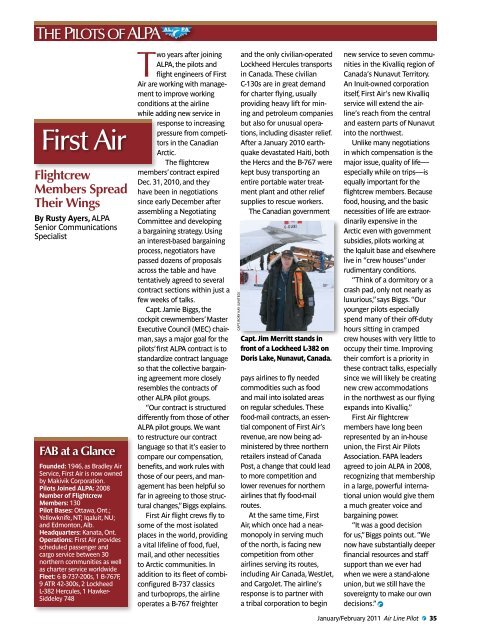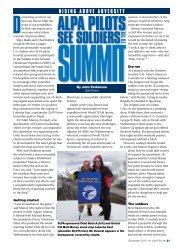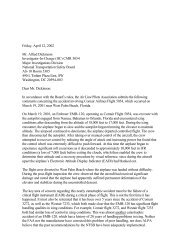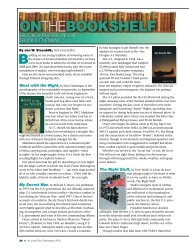The Pilots of ALPA - Air Line Pilots Association
The Pilots of ALPA - Air Line Pilots Association
The Pilots of ALPA - Air Line Pilots Association
You also want an ePaper? Increase the reach of your titles
YUMPU automatically turns print PDFs into web optimized ePapers that Google loves.
THE PILOTS OF <strong>ALPA</strong><br />
First <strong>Air</strong><br />
Flightcrew<br />
Members Spread<br />
<strong>The</strong>ir Wings<br />
By Rusty Ayers, <strong>ALPA</strong><br />
Senior Communications<br />
Specialist<br />
FAB at a Glance<br />
Founded: 1946, as Bradley <strong>Air</strong><br />
Service, First <strong>Air</strong> is now owned<br />
by Makivik Corporation.<br />
<strong>Pilots</strong> Joined <strong>ALPA</strong>: 2008<br />
Number <strong>of</strong> Flightcrew<br />
Members: 130<br />
Pilot Bases: Ottawa, Ont.;<br />
Yellowknife, NT; Iqaluit, NU;<br />
and Edmonton, Alb.<br />
Headquarters: Kanata, Ont.<br />
Operations: First <strong>Air</strong> provides<br />
scheduled passenger and<br />
cargo service between 30<br />
northern communities as well<br />
as charter service worldwide<br />
Fleet: 6 B-737-200s, 1 B-767F,<br />
9 ATR 42-300s, 2 Lockheed<br />
L-382 Hercules, 1 Hawker-<br />
Siddeley 748<br />
Two years after joining<br />
<strong>ALPA</strong>, the pilots and<br />
flight engineers <strong>of</strong> First<br />
<strong>Air</strong> are working with management<br />
to improve working<br />
condi tions at the airline<br />
while adding new service in<br />
response to increasing<br />
pressure from competitors<br />
in the Canadian<br />
Arctic.<br />
<strong>The</strong> flightcrew<br />
members’ contract expired<br />
Dec. 31, 2010, and they<br />
have been in negotiations<br />
since early December after<br />
assembling a Negotiating<br />
Committee and developing<br />
a bargaining strategy. Using<br />
an interest-based bargaining<br />
process, negotiators have<br />
passed dozens <strong>of</strong> proposals<br />
across the table and have<br />
tentatively agreed to several<br />
contract sections within just a<br />
few weeks <strong>of</strong> talks.<br />
Capt. Jamie Biggs, the<br />
cockpit crewmembers’ Master<br />
Executive Council (MEC) chairman,<br />
says a major goal for the<br />
pilots’ first <strong>ALPA</strong> contract is to<br />
standardize contract language<br />
so that the collective bargaining<br />
agreement more closely<br />
resembles the contracts <strong>of</strong><br />
other <strong>ALPA</strong> pilot groups.<br />
“Our contract is structured<br />
differently from those <strong>of</strong> other<br />
<strong>ALPA</strong> pilot groups. We want<br />
to restructure our contract<br />
language so that it’s easier to<br />
compare our compensation,<br />
benefits, and work rules with<br />
those <strong>of</strong> our peers, and management<br />
has been helpful so<br />
far in agreeing to those structural<br />
changes,” Biggs explains.<br />
First <strong>Air</strong> flight crews fly to<br />
some <strong>of</strong> the most isolated<br />
places in the world, providing<br />
a vital lifeline <strong>of</strong> food, fuel,<br />
mail, and other necessities<br />
to Arctic communities. In<br />
addition to its fleet <strong>of</strong> combiconfigured<br />
B-737 classics<br />
and turboprops, the airline<br />
operates a B-767 freighter<br />
CAPT. RORY KAY (UNITED)<br />
and the only civilian-operated<br />
Lockheed Hercules transports<br />
in Canada. <strong>The</strong>se civilian<br />
C-130s are in great demand<br />
for charter flying, usually<br />
providing heavy lift for mining<br />
and petroleum companies<br />
but also for unusual operations,<br />
including disaster relief.<br />
After a January 2010 earthquake<br />
devastated Haiti, both<br />
the Hercs and the B-767 were<br />
kept busy transporting an<br />
entire portable water treatment<br />
plant and other relief<br />
supplies to rescue workers.<br />
<strong>The</strong> Canadian government<br />
Capt. Jim Merritt stands in<br />
front <strong>of</strong> a Lockheed L-382 on<br />
Doris Lake, Nunavut, Canada.<br />
pays airlines to fly needed<br />
commodities such as food<br />
and mail into isolated areas<br />
on regular schedules. <strong>The</strong>se<br />
food-mail contracts, an essential<br />
component <strong>of</strong> First <strong>Air</strong>’s<br />
revenue, are now being administered<br />
by three northern<br />
retailers instead <strong>of</strong> Canada<br />
Post, a change that could lead<br />
to more competition and<br />
lower revenues for northern<br />
airlines that fly food-mail<br />
routes.<br />
At the same time, First<br />
<strong>Air</strong>, which once had a nearmonopoly<br />
in serving much<br />
<strong>of</strong> the north, is facing new<br />
competition from other<br />
airlines serving its routes,<br />
including <strong>Air</strong> Canada, WestJet,<br />
and CargoJet. <strong>The</strong> airline’s<br />
response is to partner with<br />
a tribal corporation to begin<br />
new service to seven communities<br />
in the Kivalliq region <strong>of</strong><br />
Canada’s Nunavut Territory.<br />
An Inuit-owned corporation<br />
itself, First <strong>Air</strong>’s new Kivalliq<br />
service will extend the airline’s<br />
reach from the central<br />
and eastern parts <strong>of</strong> Nunavut<br />
into the northwest.<br />
Unlike many negotiations<br />
in which compensation is the<br />
major issue, quality <strong>of</strong> life—<br />
especially while on trips—is<br />
equally important for the<br />
flightcrew members. Because<br />
food, housing, and the basic<br />
necessities <strong>of</strong> life are extraordinarily<br />
expensive in the<br />
Arctic even with government<br />
subsidies, pilots working at<br />
the Iqaluit base and elsewhere<br />
live in “crew houses” under<br />
rudimentary conditions.<br />
“Think <strong>of</strong> a dormitory or a<br />
crash pad, only not nearly as<br />
luxurious,” says Biggs. “Our<br />
younger pilots especially<br />
spend many <strong>of</strong> their <strong>of</strong>f-duty<br />
hours sitting in cramped<br />
crew houses with very little to<br />
occupy their time. Improving<br />
their comfort is a priority in<br />
these contract talks, especially<br />
since we will likely be creating<br />
new crew accommodations<br />
in the northwest as our flying<br />
expands into Kivalliq.”<br />
First <strong>Air</strong> flightcrew<br />
members have long been<br />
represented by an in-house<br />
union, the First <strong>Air</strong> <strong>Pilots</strong><br />
<strong>Association</strong>. FAPA leaders<br />
agreed to join <strong>ALPA</strong> in 2008,<br />
recognizing that membership<br />
in a large, powerful international<br />
union would give them<br />
a much greater voice and<br />
bargaining power.<br />
“It was a good decision<br />
for us,” Biggs points out. “We<br />
now have substantially deeper<br />
financial resources and staff<br />
support than we ever had<br />
when we were a stand-alone<br />
union, but we still have the<br />
sovereignty to make our own<br />
decisions.”<br />
January/February 2011 <strong>Air</strong> <strong>Line</strong> Pilot 35





